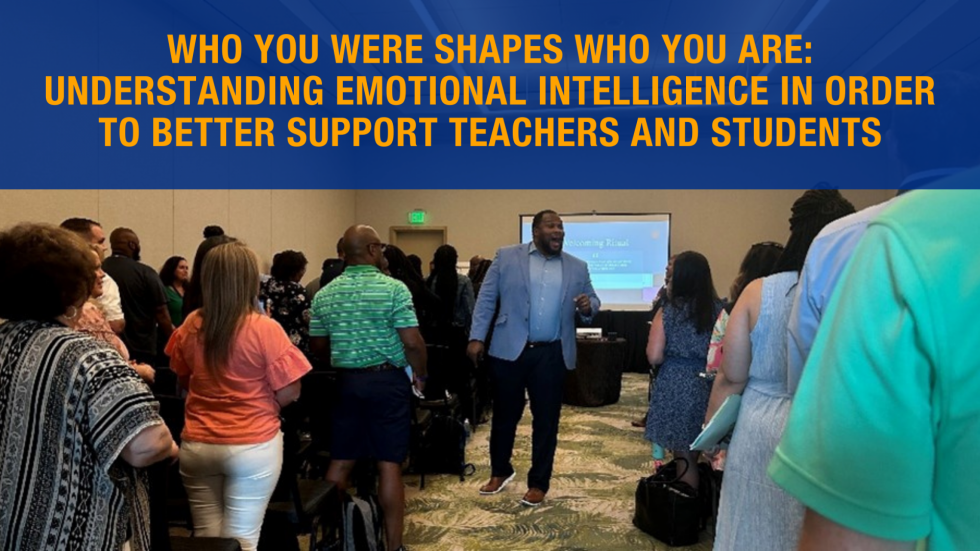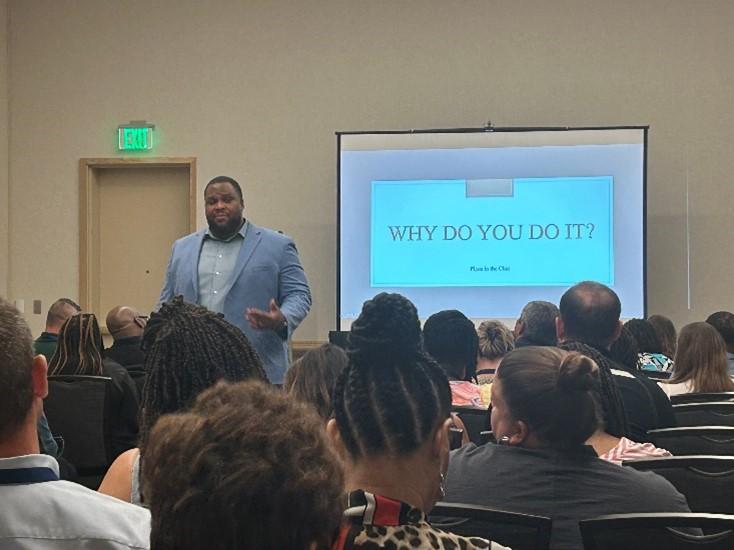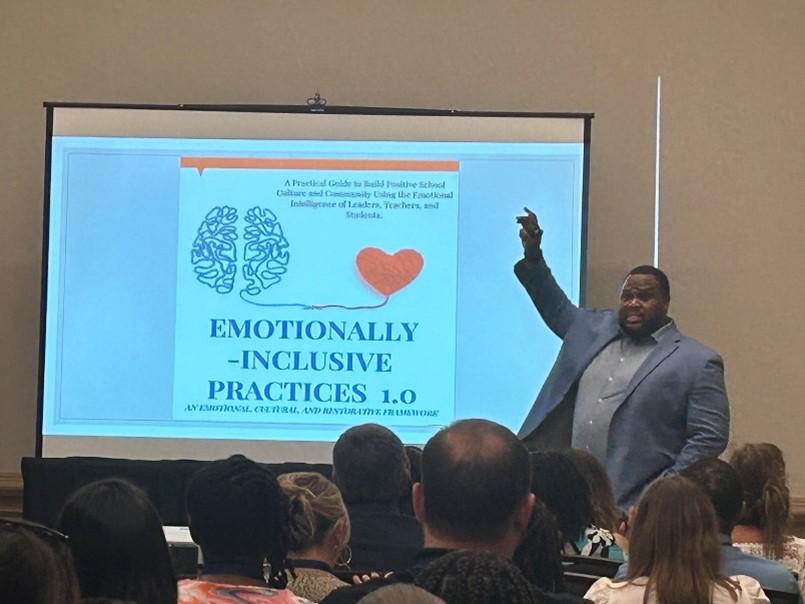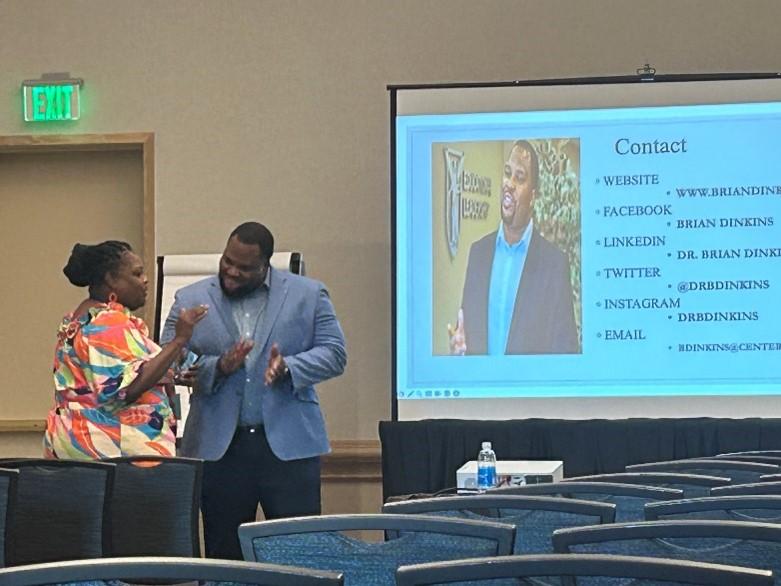Who You Were Shapes Who You Are: Understanding Emotional Intelligence in Order to Better Support Teachers and Students
Prefer to listen? Check out the audio recording of this post instead.
“It doesn’t matter how children start. If they have educators and people in their lives that can help them find a why and a purpose, there is hope for them.” –Brian Dinkins, Ed.D.
The why, the work and the career of Dr. Brian Dinkins was strongly influenced by his mom, a special education aide whose mom died when she was 11 years old. She was sent to live with an uncle who had 10 children of his own, and life for her was far from easy.
She grew up to marry a substance abuser who “smoked the rent in heroin,” thrusting young Brian and his family into a life of homelessness, struggle, anger and trauma.
By the time he made it to high school, Brian Dinkins had attended seven different schools in Indianapolis, Indiana. He became caught in the cycle of doing just enough to get by, but his love for playing football pushed him to graduate high school. He went to college, not for an education, but to play football- the only thing he truly valued as kid.
Brian candidly shared his story with attendees at his 2023 Making Schools Work Conference session, “Leading with Your WHY: Setting the Conditions for Positive School Culture.”
A Path Towards Teaching
As a young man raised in trauma, by parents raised in trauma, Brian was drawn to psychology as his college major. His classes served as a therapeutic support for him, which he needed even more after not being drafted for the NFL, graduating college with nowhere to go but home to his mom’s house and a life of poverty he thought he’d escaped.
Brian fell into a depression in the months following graduation. He found himself working as a substitute teacher in Indianapolis Public Schools, where for the first time in his life, he felt like he had found purpose, and the darkest days of his life finally had meaning.
His crazy, but rewarding, experiences as a substitute led him to become a special education teacher with a class of 32 students — 30 boys and two girls!
By now, the students were teaching him about being unique learners with unique needs.
The Move to Leadership
As Brian began to learn from his students, he also began seeing that some teachers didn’t have the skills to support all their students.
He decided he wanted to figure out how to change that by serving teachers and students in a greater capacity. With encouragement from a mentor, Brian went back to school to become a principal at a charter school back in his old neighborhood.
Emotional Intelligence Matters
As a principal, Brian was introduced to the ACES research study by the Centers for Disease Control and Prevention. Through this research, he realized that his childhood experiences could have been impacting the conditions he was creating for students and teachers as a school leader and may be causing more hurt than help.
He didn’t want there to be a disconnect between what students were offered as support and what they needed. He decided to take an emotional intelligence assessment, invest seven months into growing his own emotional quotient and dedicate his next course of life to understanding how to support educators in developing skills and strategies for emotionally inclusive practices in schools.
Brian had learned through experience and education that failure to understand the effects of trauma, inability to express emotions in a healthy way, lack of sense of belonging and environmental conditions at school could be hindering to students finding purpose, school success and making a difference in the world.
What the Research Says
The transparency Brian displayed demonstrated the importance of connecting your why to your work created a safe and supportive session environment for participants to look at their own practices and open up to areas needed for growth.
He provided a Padlet resource with a 65-page document for all attendees based on his practical and skill-based framework for leaders, teachers, staff and students from his book Emotionally- Inclusive Practices 1.0: An Emotional, Cultural and Restorative Framework.
According to the framework, there are six core practices that transform the classroom and school community:
- Emotional Intelligence- Learn to develop the ability to understand, manage and use their emotions in a proactive and positive way.
- Restorative Community- Learn the skills necessary to build, repair and enhance relationships within a collaboratively designed community.
- Unbiased- Develop an awareness and understanding of implicit bias and learn skills and strategies that address hidden prejudice, stereotyping and unfair treatment.
- Cultural Consciousness- Develop an awareness and understanding of culture and learn skills and strategies that create belonging in the classroom.
- Trauma-Sensitive - Develop an awareness and understanding of trauma and learn skills and strategies that create safety, vulnerability and support.
- Equitable- Develop an awareness of understanding of equity, define equity as a community and develop the processes and systems that ensure equity for all stakeholders.
Final Thoughts
Participants gathered after the session for continued conversation, photos and praises for an empowering and informative session.
As you look for ways to better support your teachers and students, think about what you know about emotional intelligence and how you can use that to better create a learning environment that will reach everyone.
Make sure you catch all of the 2023 Making Schools Work Conference stories by signing up for the Promising Practices newsletter!





